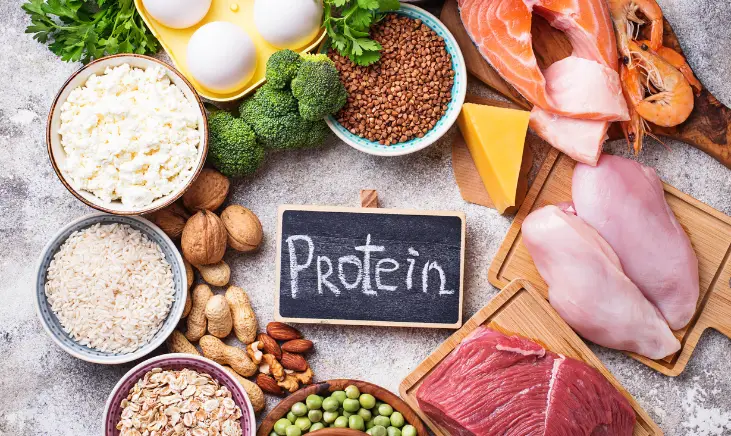In the world of digestive health, a buzzworthy supplement has been making waves—L-glutamine. L-glutamine is a versatile amino acid that plays a crucial role in supporting immune function, enhancing gut health by maintaining a healthy gastrointestinal tract, improving poor gut health, and facilitating muscle protein synthesis.
The versatility of L-glutamine makes it beneficial for overall well-being and physical performance.
For those who suffer from leaky gut, irritable bowel syndrome (IBS) or inflammatory bowel disease (IBD), glutamine supplementation may be a beneficial addition to lifestyle and medical treatments.
Join me as we explore the connection between L-glutamine for digestion including: does L-glutamine help with bloating, does L-glutamine help with regularity, and do I need glutamine supplements for better digestion?
Table of Contents
L-glutamine for Gut Health
As one of the most abundant amino acids in the body, L-glutamine is essential for various physiological processes, including immune system support, maintenance of the intestinal lining, and muscle recovery. Your body converts something called glutamic acid, or glutamate, to L-glutamine, a nonessential amino acid.
L-glutamine is also considered a conditionally essential amino acid. Conditionally essential means our body produces it, but it becomes necessary to get through your diet under certain circumstances. These circumstances include:
- Stress
- Pregnancy
- Infancy and growth
- Increased muscle growth
- Performance recovery
- Illness
- Wound healing
If your body can’t make enough, you must get this amino acid from your food or glutamine supplements. Most people don’t get sufficient L-glutamine from their food, especially if they eat diets low in protein, have a lot of stress, do a lot of intense exercise, have a suppressed immune system, are going through cancer treatments, or have been dealing with long-term digestive problems.

There is a symbiotic relationship between the gut microbiome and L-glutamine. The gut microbiome, a diverse community of trillions of microorganisms residing in the digestive tract, plays a pivotal role in maintaining overall health. This amino acid serves as an essential energy source for the rapidly dividing cells of the intestinal wall, contributing to the repair of damaged tissues.
Improve Your Intestinal Health
Although classified as one of the nonessential amino acids, research suggests that L-glutamine can be one of the most valuable amino acids in the quest for healing the gut due to its anti-inflammatory pathways in the body. It aids in healing and maintaining the integrity of the intestinal lining, thereby reducing permeability and promoting a healthy barrier function.
Leaky gut, or increased intestinal permeability, is a condition where the lining of the digestive tract becomes compromised, allowing harmful substances to leak into the bloodstream. This can contribute to inflammation and various health issues. L-glutamine supplementation may help reduce intestinal permeability by supporting the repair and regeneration of the mucosal lining. By promoting a healthy gut barrier, L-glutamine has the potential to alleviate symptoms and contribute to overall gastrointestinal well-being.
L-glutamine has emerged as a promising ally in IBS management, offering potential relief for individuals grappling with this common digestive disorder. Studies suggest that L-glutamine’s anti-inflammatory properties and its role in maintaining intestinal permeability can contribute to mitigating symptoms associated with IBS. This amino acid has been found to play a crucial part in reducing gut permeability, a key factor in IBS pathology.
By supporting the healing and maintenance of the intestinal lining, L-glutamine may help alleviate common challenges faced by those with IBS including:
- Abdominal pain
- Bloating
- Irregular bowel movements
As with any health-related decision, consulting with a healthcare professional is crucial for personalized guidance and recommendations tailored to individual needs and conditions.
This amino acid is also being researched for its role in supporting intestinal health in the context of IBD. IBD includes intestinal diseases like Crohn’s disease and ulcerative colitis, which involve chronic inflammation of the digestive tract, leading to a range of debilitating symptoms. L-glutamine has been associated with modulating immune responses, helping to regulate the delicate balance between pro-inflammatory and anti-inflammatory signals in the gut.
While some studies have shown glutamine supplementation to assist in reducing inflammation and alleviating symptoms associated with IBD, there is not enough data to indicate that glutamine supplementation affects disease course. Individuals need to consult with healthcare professionals before incorporating L-glutamine into their treatment regimen, as each case of IBD is unique, and personalized medical advice is crucial for optimal outcomes.
Will It Help With Bloating?
One of the common digestive complaints many individuals face is bloating. Observational studies indicate that L-glutamine may play a role in reducing bloating by supporting gut integrity and reducing inflammation. While individual responses may vary, incorporating L-glutamine into a well-balanced diet may be worth considering for those seeking relief from bloating, specifically IBS.
Concerns often arise about whether L-glutamine itself can cause bloating. It’s essential to distinguish between individual responses and potential side effects. While some people may experience temporary discomfort, starting with a lower dose and gradually increasing it allows the body to adjust. Additionally, consulting with a healthcare professional or registered dietitian can provide personalized guidance based on individual health needs.
Another common question revolves around bowel habits: does L-glutamine make you poop more? The answer varies from person to person. L-glutamine’s role in supporting gut health may positively influence bowel regularity for some individuals.
In contrast, others may not notice a significant change. As with any dietary supplement, paying attention to your body’s signals and adjusting the dosage and the time you take it accordingly is helpful.

When to Use Glutamine Supplementation
For those considering adding L-glutamine to their regimen, it’s crucial to prioritize a balanced diet rich in whole foods high in amino acids. L-glutamine is an abundant amino acid, and you can usually get enough L-glutamine through various dietary sources:
- Meat
- Fish
- Dairy products
- Beans, peas, and lentils
However, individuals with specific dietary restrictions, those not eating enough protein, or those aiming for targeted support from L-glutamine to heal the gut may consider L-glutamine supplements under the guidance of a healthcare professional.

Choosing Quality Glutamine Supplements
Selecting the right L-glutamine supplement is crucial for those seeking to harness the potential benefits of this amino acid, especially in the context of gut health and conditions like IBD. When choosing the best L-glutamine supplement, several factors should be considered.
- Opt for a high-quality, pharmaceutical-grade product to ensure purity and potency. Look for supplements that are free from unnecessary additives, preservatives, and allergens. Third-party testing and certifications, such as those from NSF or USP, can provide assurance of product quality.
- Consider the form of L-glutamine. While glutamine powder offers versatility in dosage and mixing, capsules may be more convenient for some individuals.
- Consult with a healthcare professional as they can offer personalized advice based on individual health needs and potential interactions with other medications or conditions.
The potential benefits of amino acids supplements for gut health are evident, making them valuable considerations for individuals seeking relief from common digestive system issues. By addressing gut permeability and supporting the healing of the intestinal lining, L-glutamine, as a key amino acid, emerges as a promising aid in managing abdominal discomfort.
While questions about potential side effects, such as bloating or increased bowel movements, may arise, the overall consensus supports the positive impact of L-glutamine supplements and amino acids on gut health. Incorporating these supplements into your routine may indeed prove beneficial for those navigating the intricate landscape of digestive health. With the combined benefits of amino acids and L-glutamine supplements, individuals can take proactive steps toward fostering a healthier and more balanced digestive system.
FAQs
How much glutamine should I take for gut health?
L-glutamine dosage can vary based on your health condition, age, weight, and specific health goals. It is crucial to consult with a healthcare professional, preferably a registered dietitian or a doctor, for personalized advice. The recommended dosage may vary depending on the reason for taking it, such as gut health, immune system support, or athletic performance. The observed safe level (OSL) for L-glutamine is up to 14 grams per day.
What are the symptoms of L-glutamine deficiency?
L-glutamine deficiency is rare because the body can produce this amino acid, which is also obtained from various foods. However, certain conditions or factors may lead to lower levels of L-glutamine.
Symptoms of a deficiency may include:
- Impaired immune function
- Digestive issues
- Muscle wasting
- Delayed wound healing
- Mental fog
- Impaired cognitive function
It’s important to note that various factors can cause these symptoms, and a healthcare professional should be consulted for a proper diagnosis. If you suspect a deficiency, you must thoroughly evaluate the underlying cause and receive appropriate guidance on supplementation or dietary changes.
When should I take L-glutamine for bloating?
There is not a conclusive answer to the best time to take glutamine supplementation. The recommendations for timing L-glutamine will vary among individuals. Experiment with the best time for you.
Is it safe to take L-glutamine long-term?
Taking glutamine supplements is generally considered safe for long-term use when taken at recommended dosages. Many people use L-glutamine supplements for extended periods without experiencing significant adverse effects.
What happens if you take L-glutamine on a full stomach?
Taking L-glutamine on a full stomach is generally considered safe, as it is an amino acid naturally present in many foods and is part of the regular diet. However, individual responses may vary, and some people might experience mild gastrointestinal discomfort, such as bloating or gas, when taking supplements on a full stomach.
If you have concerns or experience persistent pain, consulting with a healthcare professional is always a good idea. They can provide personalized advice based on your specific health condition and needs. Additionally, following the recommended dosage on the supplement label and any guidance provided by your healthcare provider is essential to ensure safe and effective use.
Who should not take L-glutamine?
While L-glutamine is generally considered safe for many individuals and is widely used to support various aspects of health, there are certain groups of people who should exercise caution or avoid taking L-glutamine altogether. Individuals with kidney disease should be particularly mindful, as excess amino acids, including L-glutamine, may put additional strain on the kidneys. Those with a history of allergies to glutamine or any of its derivatives should steer clear of supplementation to prevent adverse reactions. Additionally, people undergoing chemotherapy or with certain types of cancer should consult their healthcare provider before using L-glutamine, as it may interfere with treatment outcomes. Pregnant and breastfeeding women should also seek medical advice before incorporating L-glutamine into their regimen, as the safety of supplementation during these periods is not yet well-established. Ultimately, before starting any new supplement, it’s crucial to consult with a healthcare professional to ensure it aligns with individual health conditions and medication regimens.
Does L-glutamine help with a healthy weight?
L-glutamine may play a role in supporting muscle mass, which is crucial for metabolic health and weight regulation. Incorporating L-glutamine into a balanced lifestyle, alongside proper nutrition and exercise, could be a holistic approach for those navigating the challenges of weight management.
References













